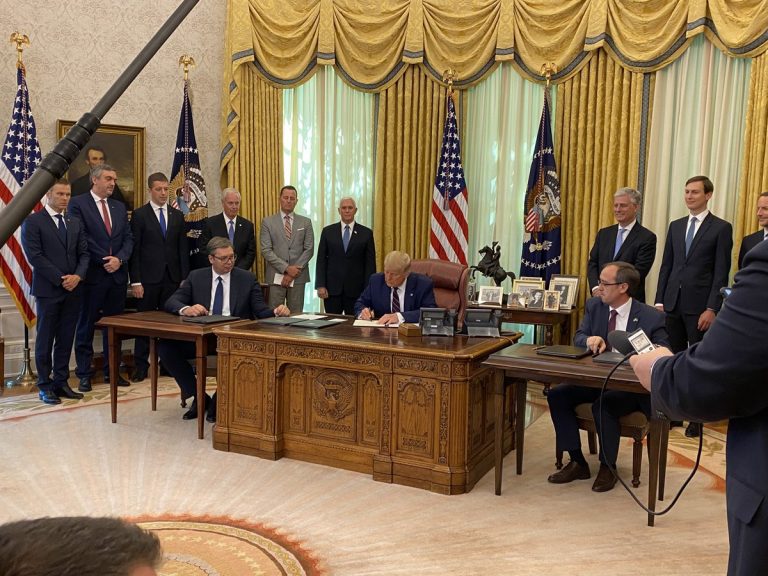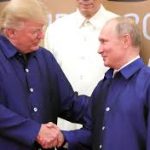On the fourth of September, Kosovar Prime minister Avdullah Hoti and President of Serbia Aleksandar Vucic signed an agreement at the White House in presence of the US President Donald Trump. This sounds like a good idea at first glance but was this an international legally binding agreement?
To start with, parties, namely Kosovo and Serbia signed different documents and US President signed a letter to confirm his engagement and support for the “Agreement on Economic Normalization.” That in itself is a deviated practice of international agreements where parties sign the same document in several copies. Although this `economic normalization agreement` was publicized by US Special Envoy Richard Grenell as breakthrough agreement, it seems that it is not so much about neither Kosovo and nor Serbia.
To start with, the agreement repeats two other agreements reached in February 14, 2020 between Kosovo and Serbia on the field of Belgrade- Prishtina highway and Belgrade-Prishtina rail with the addition of joint feasibility study of rail infrastructure to a deep sea port in the Adriatic. The last point presumably will include Albania in a later stage which is why, the idea of Mini-Schengen was revived in this agreement. The Mini-Schengen is supported by the Albanian Prime minister Edi Rama as well as by the North Macedonia. Previously, this idea was rejected by Kosovo Prime minister Avdullah Hoti. There are more technical points in the agreement which seems to tautologically repeat what Brussels Agreements discussed for years.
Another point is that Kosovo and Serbia will mutually recognize diplomas and professional certificates which was discussed in Brussels for years. This point serves very well as most of Albanians who live in the Presheva valley are educated in Albanian language in Kosovo and their education is not recognized in Serbia. There are fewer Serbs who go through education system in Kosovo but the point is very valid but not undiscussed before in Brussels.
Feasibility study for the Ujmani lake is something that both Serbia and Kosovo agreed to do jointly for sharing it as reliable water and energy supply which effectively gives Serbia stakes inside Kosovo territory. The Ujmani lake was built upon a loan from the World Bank in 1972 with the cost of $45 mil. When Kosovo declared independence in 2008, it assumed its entire share of Ex-Yugoslavia debt including this loan from the World Bank. Now, this whole deal is being re-negotiated and it is presumed that this agreement not only does not normalize it but is opening a whole new can of worms for the conflict over this water resource.
A point of interest in the agreement is also the part where parties agree to prohibit use of 5G equipment supplied by untrusted vendors. Implicitly, this is reflecting on the deal Serbia had with China where the latter already started to install equipment. According to Reuters, China has provided billions of euros in soft loans for infrastructure and energy development in Serbia. This has implications also with Huawei deal in Serbia where Huawei, is also involved in a project with Serbia’s Interior Ministry entailing the installation of over 1,100 surveillance cameras at an undisclosed cost for Belgrade’s Safe City surveillance system of traffic and crime control. This point of interest seems to be more in the interest of US foreign policy than point of any normalization between Serbia and Kosovo.
Similar to the previous point, airline passenger screening and information sharing with each other within the framework of broader US cooperation in the Balkans, is in the interest of US foreign policy and its security measurements. Kosovo has already installed screening and information systems of US standards along with those of EU but Serbia has not.
Serbian Orthodox Church gets a mention on a subject that is important for Vucic´s popular support in Serbia although, it is Serbia that organized a massive campaign against Kosovo´s bid to membership in UNESCO which has the very aim of preserving cultural and religious heritage in Kosovo.
Similar with the issue of missing persons. Serbia has even employed war criminals to teach in military schools. last year, a Serbian commander from the Kosovo War has been offered a job teaching at Belgrade’s military academy. The government is not bothered by the fact he was jailed for war crimes. Missing Persons and other war crimes are simply an imposed agenda from abroad in Serbia and there is lack of commitment to resolve this question for the last 21 years after the end of war. Missing persons´ families meet regularly in Prishtina, Belgrade, Brussels but Serbian government has not been interested to reveal any archive of the Yugoslav Army and help finding missing bodies.
Decriminalizing homosexuality and designation of Hezbollah as terrorist organization is part of the US foreign policy. Kosovo has most liberal laws in relation to homosexuality and is openly supporting issues of LGBTQ and declared Hizballah a terrorist organization some years ago.
This agreements more controversial points are left right at the end. Kosovo refrain from seeking international organizations membership for a year and Serbia refrains its de-recognitions campaign for a year. This point has been violated the next day by Serbian foreign minister Ivica Dacic when he asked Israel to review its decision to recognize Kosovo.
Perhaps the best win for Kosovo on this agreement is that it has got a recognition from the state of Israel. This is an important recognition for Kosovo heaving in mind that last two years, there was more de-recognitions due to Serbian campaign. The hunch is that US has asked both Serbia in written and Kosovo through the phone call with Prime minister Natanyahu to open state embassies in Jerusalem.
The implications of the last point in the economic normalization between Kosovo and Serbia are far from Kosovo and Serbia. Serbia run into trouble with the EU who asked Serbia to align itself with the `EU foreign policy` and not open the embassy in Jerusalem while Kosovo found itself under critical notes from both EU and Turkey. In addition, Kosovo is sold at least in the social media by both Trump and Natanyahu as a “Muslim Country recognizing Israel and opening the embassy in Jerusalem” which has further implications on Kosovo`s bid for more recognitions both in the region and globally. Overall, the “economic normalization agreement between Serbia and Kosovo” seems to be more of a bullet pointed wish list made to serve elections of Donald Trump than normalize anything between Kosovo and Serbia. Although this agreement was welcome in the EU Dialogue process on the 7th of September by Borrell and Lajcak, it was mentioned the parties are still working for a “comprehensive legally binding agreement.” Implicitly, this left the understanding that the `agreement` signed in the White House is neither normalizing nor legally binding.
Author
-

Kosovo based analyst that focuses on current affairs, communication and technology. She studied Albanian Literature, and Economics, Management and Information Sciences. MA in Journalism and Communication. Co-authored the Worlds of Journalism Study report on Kosovo Journalists.
View all posts




